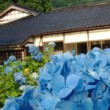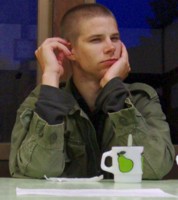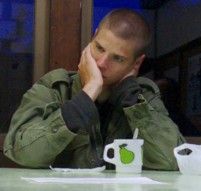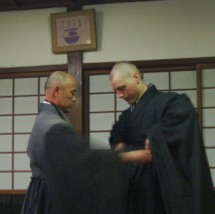 |
|
...The shit stick is to wipe your ass after you shit. Another way is to use paper. Old paper should not be used, nor paper with characters written on it. Distinguish between clean shit sticks and dirty shit sticks. The sticks are ten inch long, of triangular section, and the thickness of a thumb... (Shôbôgenzô Senjô) |
|
| June | |
|
What do you "practice"? (Adult practice - Part II) |
|---|
|
Let me continue with my reflections on "adult practice". It will probably cost me a couple of months or more to complete this series, but I would be honoured if you joined me for a while. I would like to begin this time with the head of the "Guide to Antaiji", a booklet that we give to all the visitors here, and that is also part of this homepage: "Why do you come here? Antaiji is a temple devoted to Zen practice as a natural expression of life. Zazen and work are not simply practiced as one part of life, rather all 24 hours of your daily life itself are to be the manifestation of Zen. Antaiji has no other special practices, teachings, meditation techniques, insights or spiritual guidance to offer you. Nor is it a place to get in touch with the mystery of the East, have occult experiences or just have a taste of Japanese culture. This is a place where you can create your own life as bodhisattva practice. Although you are expected to live harmoniously with the other practioners at Antaiji, the responsibility for your practice lies solely on yourself. There is no one to live your life for you. Nobody will wipe your ass for you. What is most important is not to use the buddha way for your own purposes, but rather to give up your own ideas and throw yourself completely into the practice of the way. For this, you should be clear about the basis of your practice and the motive that brings you here. If you expect anything other from your stay than what life at this precise moment has to offer you, you will invariably be disappointed. Make sure you know why you want to come here - do not fool yourself or others." I wrote this ten years ago, as a guide for foreigners who want to practice at Antaiji. At that time I was 25 and an exchange student at Kyoto University, visiting Antaiji to participate at the monthly sesshins. It was before I was ordained as a monk. The abbot, who later was to become my master, asked me to write a little guide book for foreign visitors in English, which I gladly agreed to do. Later, after becoming a monk at Antaiji, I translated it into Japanese, and even now it is used here for both Japanese and foreign visitors. What I wrote is pretty pretentious for someone who is not even a zen monk himself. I had spent six months in Antaiji at the age of 22, but at that time I was more a like a "spectator" of the zen life, understanding bodhisattva practice intellectually, without really knowing the pain of actually putting that practice into practice in daily life, 365 days a year - on a life time basis. After becoming a monk at Antaiji, I fortunately had the opportunity to jump over the gap between ideal and reality when I had to put into practice what I only wrote about formerly. Anyway, what made me write the above passage as an exchange student? The most important reason, I think, was that I realized that during the first ten years of my zazen (to which I was introduced when I was 16), my practice had been directed totally wrong. I had been looking for some kind of Eastern wisdom, or rather a kind of wisdom that transcends east and west and defies ordinary logic. People call it enlightenment or satori or the true self or the meaning of life. Seekers of truth have been looking for it for ages. I, too, thought I was looking for it, but the more I tried to get a grip on it, the further it seemed to move away from me. I had to make my way to the other side of the planet (how could you possibly find the absolute truth in a place like Germany?!), without ever realizing that in each single moment of the present, life was already realizing itself. Truth was manifest all the time, I just never cared to take notice, because I was looking the other way, for things I supposed to be far away: Satori, wisdom, etcetera. The first time I had a vague idea that my efforts were directed wrongly was during that 6 months stay at Antaiji, when I was 22. I felt that I had found the place where to become a monk, although I still thought that I should finish my university studies before I enter the buddha way. At Antaiji, I found a monastery in a almost perfect location, with a master I could trust and a couple of senior monks whom I could respect too. On the other hand, there were also those monks which made me wonder why they had come to Antaiji in the first place - what were they "practicing" here? They seemed to do nothing but sleep and eat and bully their juniors... Thinking back about it now, this was probably just another projection of my own immature mind. To be continued next month.
(Docho)
 |
|
Hokkaijoin is for statues. Shakyamuni was a thumb-twiddler |
|---|
A mix tape of songs that get stuck in my head during zazen:
I've been finding myself strangely excited that the abbot and his wife are expecting a baby. the mind of an infant is an ideal that occurs to me often while practicing zazen. When I'm wondering why the ego and the discriminating mind exist at all, if they ultimately serve as barriers between ourselves and 'the Way', the mind of a baby provides an interesting demonstration of the developement of self and its purpose. I think William James described the world of a newborn as a "big buzzing confusion", or something to that effect. Indeed, the parts of the brain that process visual and audio input are not even distinct yet; the baby cannot distinguish between a sound and, say, a color, it is simply in the midst of a grand and uniform 'happening'. The exact experience is probably impossible to imagine and certainly impossible to remember since the hippocamus is not yet online, preventing the baby from creating conscious memories. Piaget and others have extensively studied the psychology of babies throughout the stages of developement and it has been determined that a child's sense of possesion of experience is something that happens gradually, that as the child develops the faculty to make sense of its environment and the things that are happening it only later will come to understand who it is happening to. A friend once discribed a child in this stage as a "subject in search of an object". I'm looking forward to the birth of this baby. I'm excited to meet someone who is completely in the moment and completely absent of any trace of ego. It will be nice to be in the presence of such an accomplished practioner of zen. Also: Joel wanted me to mention that once I was trying to hose my shit down the toilet but I was holding the water gun backwards and nearly sprayed a bunch of water in my face. When I admitted this at samu break I tried to explain how confusing the water gun is to a newcomer, but no one was really listening at that point because they were all too busy having a good laugh at my expense. Ha ha ha.
(Paul)
  |
| empty performance |
|---|
|
Quite a few conscious-quaking realizations have come to me while sitting during zazen at Antaiji. For a sampling: Listening to the variety of bird-calls outside the Hondo, I have concluded that they are almost definitely saying, "Here I am!" "Now I'm over here", "and now I'm over here!". Also, I have a pretty good idea about what will happen if (when) I attain a higher level of "zen development": getting up for Kinhin and spontaneously, (yet in slow-time), doing the moonwalk. I have finally come to terms with the fact that playing connect-the-dots on the zendo wall is only fun for about twenty seconds, at which point zazen takes the lead. (Though eliminating this altogether from my daily sitting would mean ignoring my new animal-shape friends.) Yet to give the wall enough credit, zazen eventually wins my attention only because of the wall's incredible disappearing act. "Illusions", confesses my small mind. Although the rectangle in front of me has gone, everyday materiality makes bold impressions, leading to spontaneous reactions with every eye-blink. Puzzle-pieces of space dance to and fro in interspaces; even air is organized into distances. As our small mind tries to mimic and hastily categorize the patterns around us, perhaps the zendo wall's disappearance could form the horizon line which steadies the rocking ship of the reactionary self. Aware of the Now, yet not labeling sounds or gauging depth or controlling sensation. Without demarkations, dissolving into a fluid state of being. The pull of letting the moment breathe for itself. Perhaps Health is in letting things be. ...In being the performance itself.
(Sarah)
 |
| My Sempai |
|---|
|
Two of the most challenging things about living at Antaiji, for me, are the millions of rules, some big, many small, and the fact that you are part of a community. Antaiji is certainly not a place where you just sit back, do zazen and enjoy the mountains. This is because, although zazen can be said to be the basis of Zen, Zen is not only zazen or seated meditation. In Zen, we need to cultivate the attitude that everything we encounter is our life, thus bringing that same 100% single-minded concentration of shikan taza (just sitting) meditation to all our daily activities here, including eating, outside work, cleaning, cooking and especially things we may consider mundane, like arranging our slippers straight or bowing before we go to the toilet.
Although I have discovered a lot about myself by doing zazen (especially during the sesshins), it is in these other activities where I really came face-to-face with my ego. Attention to detail is not my strong point, so the many temple rules highlighted my laziness, while having to contribute to a community and constantly think about the needs of others highlighted my selfishness. But there was also another influence: my sempai (senior), who left Antaiji recently after a 3 month period, who had lived here a total of 7 years. The sempai/kohai (senior/junior) system is a hierarchial structure deeply embedded in Japanese culture, which requires those lower on the ladder respect and often submit to those higher on the ladder. Although it is not so evident at Antaiji, nonetheless I still had to adapt to this system. Everyday my sempai would become angry with me for something - there was always something I was doing wrong - and I had grave doubts that I could ever follow all the rules. There were times when I though about leaving. But looking back, I was really fortunate to have a sempai here, someone to challenge and push me beyond my lazy and selfish limits. I remember working as tenzo (temple cook) and, at the conclusion of every meal, immediately being told of my mistakes. If I had done about 7 things correctly and 3 things incorrectly, then mention would rarely be made of the good things, whereas without fail I would be told my 3 mistakes. Of course I became very frustrated with this, but it forced me to focus on improving, rather than seeking praise or working for reward. With such an attitude the ego drops away, and you walk along the Buddhist path, acting without expectation. Besides, in both the case of my sempai and the abbot here, I have great respect for them, When they become angry at me, it is never from the standpoint of their own egos. Rather, they are like me - they have made the same mistakes I am now making, and many more, in the long time they have spent here. They become angry at me just as their sempai became angry at them. Life is a great cycle and everything is one. We are not separate from our neighbour. As Uchiyama Roshi said, the fool sees others as himself, whereas the wise man sees himself as others. The fool thinks he is someone he is not - he doesn't know himself. The wise man sees his own characteristics, his own merits and faults, in other people - in others' leadership, clumsiness, inconsistencies, anger, youth and old age. Thanks for your constructive criticism, Eiryu. It made me more aware of my faults. Good luck in America!
(Joel)
 |